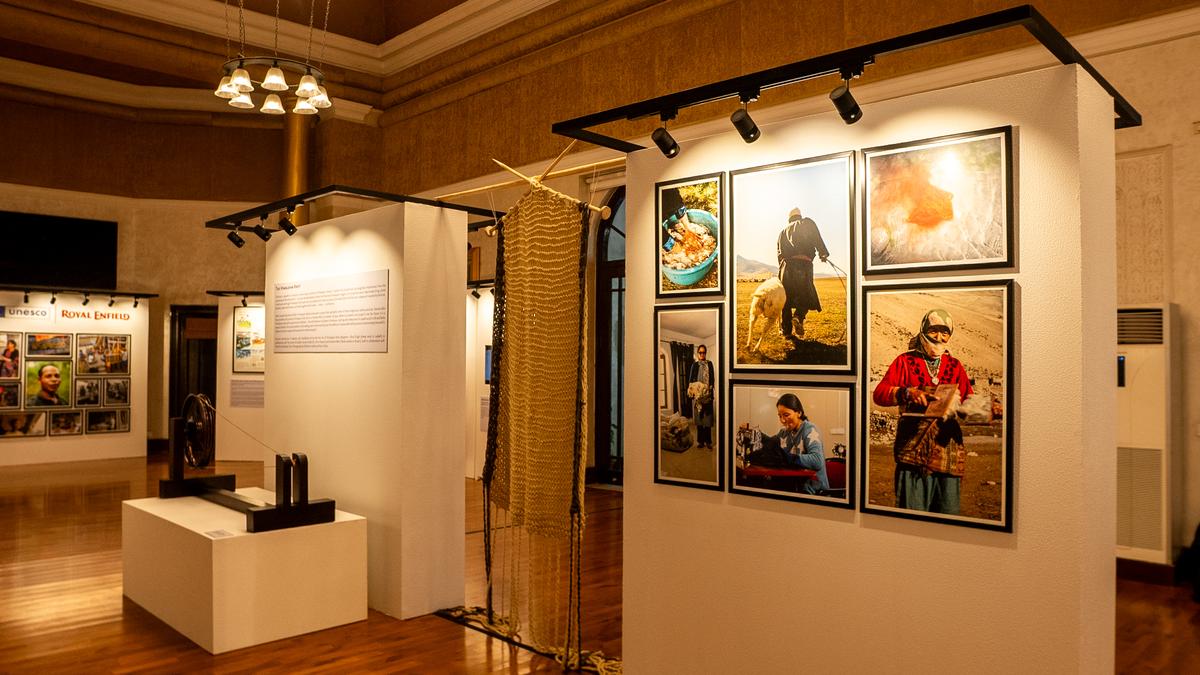For decades, Royal Enfield has been synonymous with rides across the Himalayas. Come December, and a first-of-its-kind festival, presented by the Royal Enfield Social Mission, will unfold in the capital. Titled Journeying Across the Himalayas, the 10-day event aims at spotlighting Himalayan art, textile, culture, sport, conservation, architecture, music, and sustainability by way of interactive installations, workshops, culinary experiences, performances, and more.
Royal Enfield’s Himalayan Knot launch event last year spotlighted traditional craftsmanship from the Eastern to the Western Himalayas, rooted in cultural continuity and ecological sustainability
| Photo Credit:
MITSUN SONI
One of the exhibition’s highlights is Helmeted Hyphae, a six-foot-high structure designed and executed by ST+ART, that resembles a motorcycle helmet. Constructed from mycelium — an organic material grown through a delicate process that transforms raw, biological matter into a lightweight yet durable form — it is part of the showcase by artist collective Helmets for India (HFI). A part of Royal Enfield’s road safety initiative, HFI promotes road safety and changing mindsets towards safe riding practices. In partnership with India Foundation for the Arts, their exhibit will feature the works of 12 artists using helmets “as a unique and unconventional canvas to express their individuality, emotions, experiences, and perspectives”.
An artist at Helmets for India
| Photo Credit:
MANISH SINGH
In From Folk to Fabric: The Himalayan Knot Textile Exhibition, the project bringing together Himalayan artisan communities, conservation specialists, craftspeople, and designers to conserve pastoral lands and spotlight craft practices. Curator Ikshit Pande will display the folklore of Himalayan communities through textile traditions and “visual narratives that connect these crafts to the broader environmental and cultural landscape”. “Although The Himalayan Knot textile conservation project gained momentum following its 2023 launch, the vision behind it has been evolving for years. The broader idea about this textile exhibition emerged in 2022 when we began documenting the living heritage of the region in partnership with UNESCO. During this process, we recognised the intricate interplay of heritage textiles, identity, and living legacies rooted in oral tradition and folklore of Himalayan communities,” says Ikshit, who is also Brand Strategy lead, Royal Enfield Social Mission. Key highlights of this exhibition (that traces the rich craftsmanship across nine Himalayan regions) include curated displays of regional crafts and sustainable textiles. “It captures the essence of these regions’ unique storytelling traditions, where textiles and craftsmanship embody the legacy of oral histories and folklore,” he adds.
Women from the Changpa community of Ladakh warping, spinning, and carding the sheep wool fibre in Changthang
| Photo Credit:
Shubham Lodha
“Visitors are encouraged to immerse themselves in the festival’s curated food experiences, hands-on workshops in Himalayan crafts and circularity, and a marketplace offering unique products like books, produce, and handcrafted textiles,” says Ikshit, who adds that the Fellows Showcase is a must-see. “It showcases how Himalayan youth are at the forefront of building an ecosystem of change, presenting alternative approaches to climate literacy through their work. Titled The Shape of the Wind is a Tree, the recipients of The Himalayan Fellowship for Creative Practitioners use contemporary art rooted in traditional knowledge in a presentation that exemplifies climate resilience.”
Rita Banerji, project director, Green Hub, and founding director, Dusty Foot Foundation, has curated an immersive, experiential multimedia space Through the Lens of Community, Conservation, and Culture for the event. Here, a living forest ecosystem “is imagined as a symbol of the interconnections of the years of work with communities and youth in the Himalayas, towards conservation and collective action”. “Films, photos and soundscapes will bring alive these stories of action from the Himalayas,” she says.
The Himalayan Hub in Theog went live in February 2024 with 24 fellows chosen for the Green Hub x Royal Enfield fellowship
| Photo Credit:
Special Arrangement
Rita adds that from the video fellowship to the Green Hub-Royal Enfield Responsible Tourism Fellowship, conservation grants, and living labs, “everything is part of a larger ecosystem focussed on community, conservation, and collaboration”. She adds, “And for people to come and experience it all: the voices of the people, the sound of the forest, the images, and films of the landscape and the Indigenous knowledge – we felt a space like this would help people understand the philosophy of our work in a way that’s not just informative, but also deeply engaging.” A standout feature is the canopy installation, “where we are trying to recreate the feeling of being in a forest”. Throughout the space, there will be dedicated displays where visitors can sit, relax, and watch films capturing life across different parts of the Himalayas.
A still from An Ode to the Snow Leopard
| Photo Credit:
Riverbank Studios
If cinematic experiences are to your liking, filmmakers Gautam Pandey and Doel Trivedy of Riverbank Studios will offer attendees an immersive VR experience of a highly elusive keystone species, snow leopards. Titled An Ode to the Snow Leopard, they explain how their biggest hurdle was to try and film the snow leopard in 360 VR technology. “It felt like an impossible dream to try and film a wild snow leopard in stereoscopic 8K. On the penultimate day of the shoot, luck finally came knocking. A snow leopard had made an ibex kill, and we were able to place our camera and trigger it from almost 800 metres away. After climbing up a very steep slope and setting up the camera next to the ibex kill I hid behind the only rock which was almost 800 metres away. The trigger works up to 300 metres, but somehow that day, I managed to get a single bar of connection. With a setting sun and a battery that was dying fast in the cold somehow everything worked, and we got the shot!” says Gautam, of the film funded by United Nations Development Program India and supported by the Ministry of Environment and Forests.
From December 5 to 15 at Travancore Palace, New Delhi.
Published – December 02, 2024 03:33 pm IST
